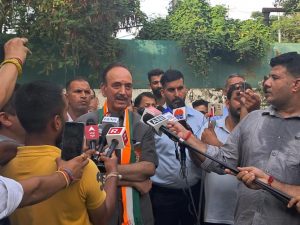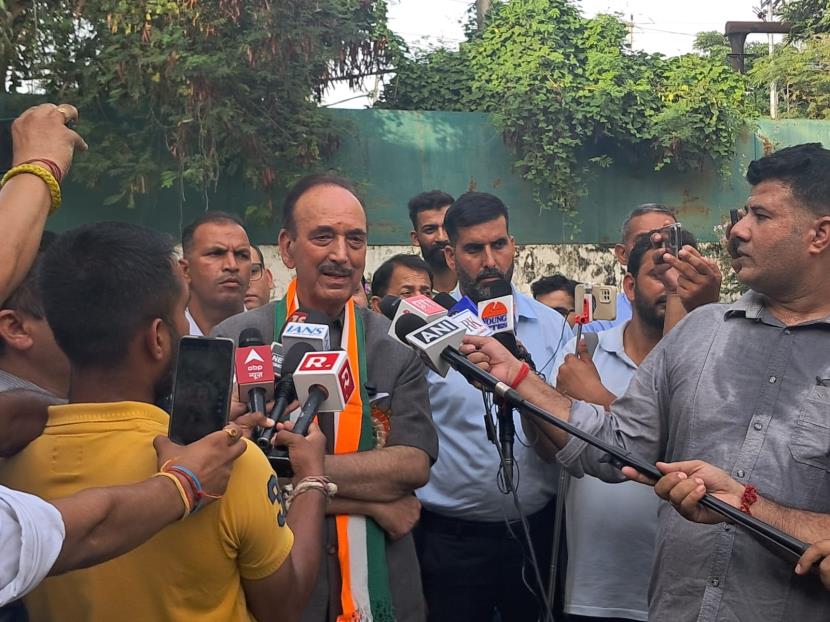JAMMU: Democratic Progressive Azad Party (DPAP) chairman Ghulam Nabi Azad has called for a unified political approach for the restoration of Jammu and Kashmir’s statehood.
Azad also expressed concern over the state of development in Jammu and Kashmir, saying while central projects were progressing, state-level initiatives were “completely halted”.
“Even the prime minister and the home minister have committed to restoring it (statehood) on the floor of Parliament. Some mistakes kept happening due to which there was a delay. First, a demand should be placed (before the government), but people immediately take to the streets,” Azad told reporters here.
“The matter should be discussed seriously, not just to divert public attention,” he said.
Speaking on the ongoing protests and political mobilisations demanding statehood, Azad asserted that while everyone has the right to protest, meaningful dialogue with the central leadership should have preceded such actions.
“Protests are of two kinds symbolic and goal-oriented. But before hitting the streets, the political leadership should have engaged with Delhi. We need unity, not fragmentation, on this issue,” he said.
Azad emphasised that the demand for the restoration of statehood has a broad consensus across communities and regions.
“There is no opposition to the idea of statehood be it in Jammu, Kashmir, or among any religious groups,” he said.
On the National Conference’s recent call for a special session on statehood, Azad welcomed the idea, stating that the Assembly is a shared platform for all parties and the matter should not be viewed through a partisan lens.
Amid speculation about his potential appointment as the vice-president of India, Azad dismissed the reports as baseless.
“These are mere rumours. Serious constitutional posts should not be discussed on the streets. The media and public should not entertain such talks,” he said.
He also parried a direct reply to questions on the Special Intensive Revision (SIR) of electoral rolls in Bihar, saying the issue remains under debate and is likely to be taken up in Parliament.
Azad also reiterated concern over development work in Jammu and Kashmir, saying that while central projects were progressing, state-level initiatives were “completely halted”.
“Development by the local administration is negligible. Labourers could easily be employed through basic infrastructure projects like roads, water, and power supply. I have visited 15 districts. People say that not even a footpath is being built. If there is a government, why is nothing visible on the ground?” he asked.
The former leader of opposition in Rajya Sabha also criticised the repeated disruptions of Parliament proceedings.
Recalling his tenure, Azad said, “I have always supported the functioning of Parliament. Even when Lok Sabha was being disrupted, during my time as leader of the opposition, Rajya Sabha would continue its normal proceedings.”
On Rahul Gandhi’s recent remarks questioning the Election Commission’s credibility, Azad refused to comment, calling it a matter between the Congress leader, the poll panel, and the government.
Regarding the sudden resignation of Jagdeep Dhankhar from the post of vice-president, Azad said he met him recently and believed that the decision was prompted by health concerns.
“I have known him for 40 to 50 years. He has cited health reasons for his resignation. I cannot say for sure whether there was any other reason. Maybe his health is genuinely not well, and that is why he stepped down,” Azad said.
Pushing for long-delayed elections in Jammu and Kashmir, Azad said panchayat, municipal, and local body polls could generate vital employment at the grassroots level and must be conducted soon.
On internal developments within the DPAP, he acknowledged that some former ministers and lawmakers had switched sides, calling it part of India’s political culture, but said the party’s grassroots support base has grown steadily.
Reacting to Farooq Abdullah’s demand for the resignation of Lieutenant Governor Manoj Sinha over the April 22 Pahalgam terror attack, Azad said that such lapses had occurred during the tenure of other leaders as well.


